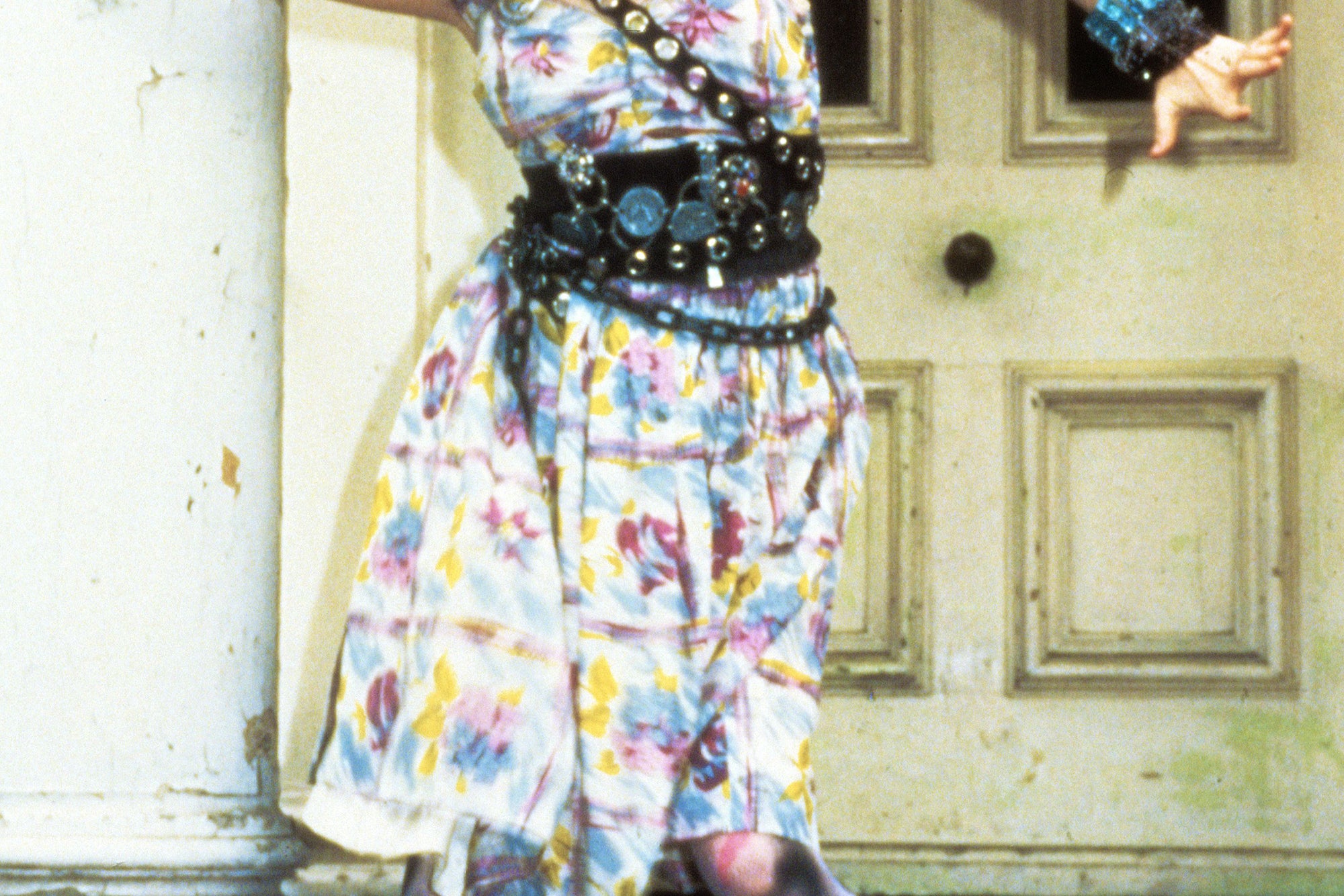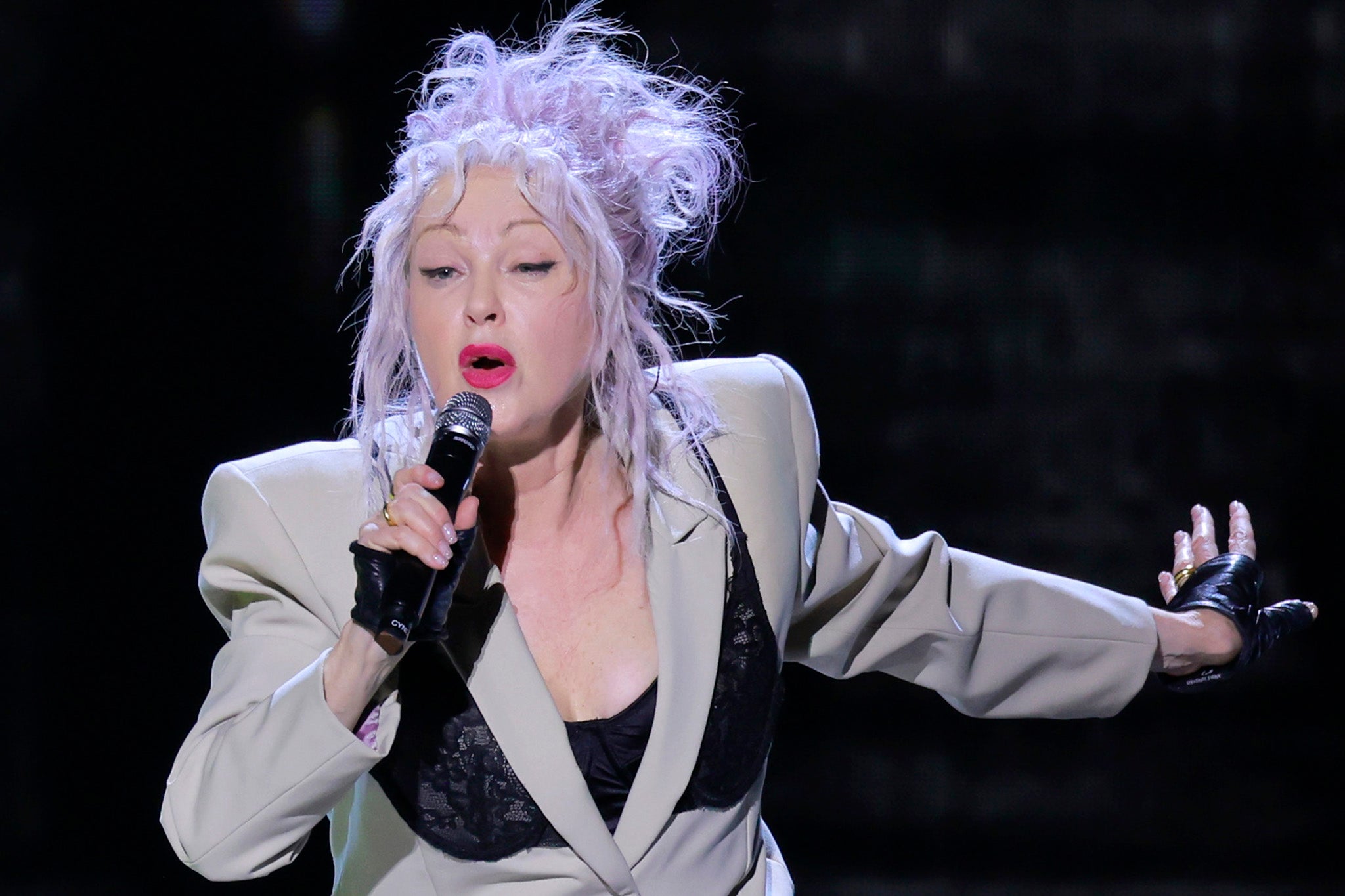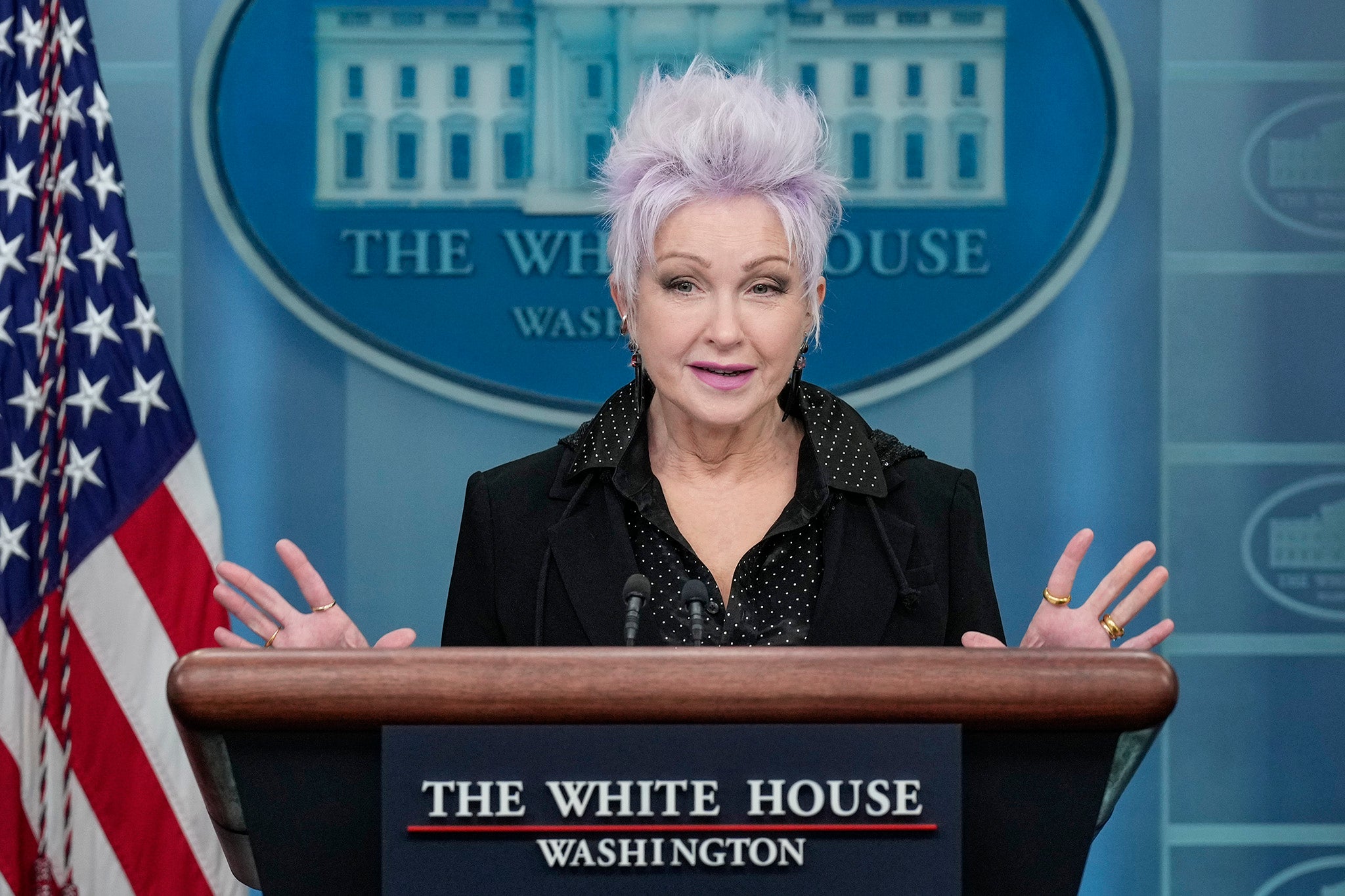
Speaking to Cyndi Lauper is, I imagine, much like going on a road trip with Cyndi Lauper. She will not stay on course, is easily distracted, and will insist upon detours. You will eventually reach your intended destination, but by that point the car is a mess: sunroof gone, tyre spiked, debris everywhere. “Did I answer anything for you or was I just rambling?” the 71-year-old asks at the end of a long jaunt that touches on retirement, Robbie Williams, community organising in 16th-century Switzerland, and how it’s amazing that she’s still friends with a woman named Francine Petrella whom she’s known since they were in fourth grade together. No wait, 10th grade.
I suppose it is amazing. But would you expect anything less from Lauper, a pop star who has always – even in her vaudevillean, rainbow-coloured, “art class oddball” way – seemed blessedly earthbound, with her heart worn on her sleeve at all times and the unmistakeable aura of a kind stranger or fairy godmother. “From the early days, everybody that came to see me perform were people that were kind of sad,” she says with a laugh, her Queens, NY, accent so thick that “kind of” becomes “keen-da”, “sad” becomes “see-ad”. “They were people who needed somebody to talk to, who needed a place to go and let their freak flag fly.”
Lauper’s biggest hits are compassionate and rebellious, with massive choruses and plastic-y sparkle, as if injected with artificial sweetener. The soaring “I Drove All Night”. The sweet cheese of “The Goonies ‘R’ Good Enough”. Her titanic ballads “Time After Time” and “True Colors” are so hushed and tender in their intimacy that it’s as if Lauper is singing to you and you only. And then there’s “Girls Just Want to Have Fun”, the first track off her multi-platinum-selling debut album She’s So Unusual (1983). It remains a cross-generational masterstroke – glittery, hopeful, a funfair.
It’s an effect Lauper is hoping to replicate on the UK and Ireland leg of her farewell tour, which kicks off in Glasgow on 8 February. Over the line from her home in New York – sans camera, as it’s “really early and I don’t want to scare you”, she says – Lauper is quick to offer some caveats. Yes, it’s a farewell, but only to a specific kind of giant arena tour with all the associated bells and whistles. “The show I do right now? I can do it,” she says. “But I’m 71, so I don’t know how I’m going to be in four years’ or five years’ time.” Plus she’s in the advanced stages of bringing a musical based on the Melanie Griffith comedy Working Girl to Broadway (she previously wrote the music and lyrics for the smash hit Kinky Boots). There’s only so much time in the day.
Recent events have pushed her further, she adds. We’re speaking a few days after Donald Trump’s inauguration, and Lauper is in low spirits. “I can’t watch the news any more,” she sighs. “But listen, this is our new president. The people who voted for him and the people who didn’t vote for him, we’re all counting on him to do better.” Lauper speaks not with anger, but with despondency. “It was a little disheartening to see the guy do the ‘heil Hitler’ sign,” she says, in reference to a gesture made by Elon Musk at the inauguration that he still hasn’t denied was a Nazi salute. “Especially when my father and my grandfather fought fascism in this country so hard. But, you know, America voted, and I do believe in the system, so…” She trails off. “Listen, it’s a little weird all over the world right now. I just wanna do shows that bring people together.”
Lauper brought her tour to Florida – prime Trump country – a day after the US election in November, and thought there was something almost utopian about it. “The show gave them hope and made them happy,” she says. “Everybody dressed up, because it’s a safe place, right? It was joyful, and we were all dancing together. And we’re all Americans, you know? You can divide yourself any which way you want, but we’re all from immigrant parents, all of us – unless you’re Native American, and then you got screwed badly, or your great-great-grandparents were kidnapped from Africa, you know? But, bottom line, we’re American, we’re a mix of everything, and that’s what it is.”
I scared a lot of people, and the suits didn’t understand that I wanted to live an artist’s life
Lauper sells coloured wigs at every stop on her tour – inspired by the variety of shades she has adopted over the years – with the proceeds going to her foundation Girls Just Want to Have Fundamental Rights, which helps to fund organisations that provide access to abortion and reproductive health services worldwide. It’s long been the Lauper way. At the peak of her commercial success in the Eighties, she used her platform to speak on the developing Aids epidemic, even though it was professionally risky. She made it clear, for instance, that “True Colors” was sung in tribute to one of her best friends, Gregory Natal, who had died of the disease. “I didn’t realise that was going to come in the way of sponsors actually funding a tour because I was talking about Aids,” she says. “But I didn’t really care, because what was most important was to talk about it. This is the thing: if you can help, then you should.”

Often overlooked in the Lauper story is quite how subversive she was considered back then. No, she wasn’t writhing around in her pants on MTV like Madonna or, well, writhing around in her pants on MTV like Prince, but she did repeatedly push boundaries, poke bears and spark debate. Her wardrobe was inspired by her years hanging out in downtown New York among punks and artists (and within her early rock band, the new wave group Blue Angel). It was full of mad skirts, chunky jewellery, belts, straps and clashing prints, and record label bosses frequently found it baffling. She would regularly criticise the Catholic Church in the press, too, having witnessed misogyny and abuse throughout her early education. “I went to a convent school and saw people behave very badly, [people] that should never have been allowed to be anywhere near children,” she remembers. “The school was called St Vincent de Paul, and I’d always say it should have been called St Vincent Appalled, because he really would have been appalled had he seen any of that s***.”
And while her early music bore the synthpop gloss that defined the biggest hits of the Eighties, Lauper was proudly feminist and unafraid of singing about sex. One track in particular, 1984’s sassy “She Bop”, was even included in the infamous “Filthy 15”, a list of songs identified by America’s conservative Parents Music Resource Center as examples of sexually explicit music poisoning young ears. Sheena Easton’s “Sugar Walls” and AC/DC’s “Let Me Put My Love Into You” were among the others.
“It really shocked me,” Lauper recalls. “I wrote it with this guy, Steve Lund, who called me up one day and he said, ‘You’ve gotta write a song about female masturbation’, and I was like, ‘Whoa, OK!’ And we did, but I wanted to make sure that it wasn’t obvious – that the grown-ups would know what it was about and have a chuckle, but then the kids would just think it’s about dancing.” The resulting track has its tongue firmly in cheek, with deliberately ambiguous references to so-called “she-bopping” and Lauper being ordered to stop such boppery or risk going blind. “I didn’t think it was so bad, or so nasty. But all of a sudden it got loony.”

Her label wasn’t concerned, believing it would only help album sales in the long-run, and Lauper herself took it in her stride. “Nobody was ever really talking about stuff like that,” she says. “I find it interesting to talk about things that people don’t want to talk about.”
Perhaps that’s why Lauper’s career has been so erratic – she’s never been one to do what she’s told, or to sit still for too long. She’s So Unusual remains her only pure commercial blockbuster of an album, thanks not only to its dazzling track list (the Prince-written “When You Were Mine” is something of a lost Eighties classic, while the soft-rock anthem “Money Changes Everything” brings to mind vintage Springsteen), but also to the timing of its release. MTV had launched just two years earlier, the visual was king, and the flamboyant, dressing-up-box explosion that was Lauper seemed born for it.
But the way she tells it, uber-fame was a bit of a drag. “I scared a lot of people, and the suits didn’t understand that I wanted to live an artist’s life,” she says. “I’d always have to go to these company things, and I couldn’t live in that hierarchy. It was a hard time. I was a radical and I wanted to live radically. I wanted to express my art and live it.” She laughs. “It probably took me way too long to realise I had no filter. I’d be at these dinner meetings with people who’d talk about business, and if they’d say something I didn’t agree with, I’d chew ’em out, and everybody would spit out their food like I’d done some horrible thing, you know?”

She’s So Unusual’s follow-up records – 1986’s True Colors and 1989’s A Night to Remember – struggled to mirror its success in the charts, and label attention dried up as she insisted on taking a more avant-garde and political approach to her work. “I was always anxious not to make disposable music. I wanted to make music that had courage and would provide light in the dark.” Over a subsequent nine studio albums – with detours into acting and musical theatre – she’s more or less done it all. R&B. Electro-pop. Alternative rock. Country. Christmas music. “I did indie for a little while too,” she says. “It was 2000, and ‘Cyndi went indie’, and then the company went bust. But I had the independent spirit in me – I remember putting pictures of Rosie the Riveter all over my little recording studio, just telling me I could do it.”
She thinks back to her early days at Epic Records, where the expectation was for her to be a pliable pop sensation with a voice only to be heard in the recording booth. “They didn’t realise who I was,” she says. “That I burnt my training bra at the first women’s demonstration that I was alive for in 1968. And I’ve been that way ever since.”
Cyndi Lauper is touring the world until April, with tickets available here







